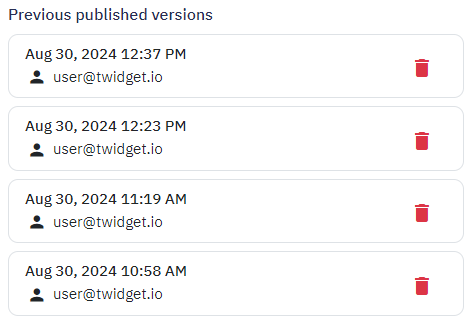With Twidget's publishing feature, you can seamlessly push your changes live, ensuring that your updates take effect on the specified endpoint, function, or event. This feature also allows for version control, enabling you to revert and manage different versions of your changes effectively.
-
In the sidebar, you will have the option to add a message. This message acts as a summary for the changes you are making. It is recommended to add a brief description to keep track of the modifications.

After optionally adding your publish message, click on Publish. Your changes will now go live, and a new published version will be stored in the system.

Twidget stores each published version, allowing you to:
Revert to Previous Versions: You can roll back to any previously published version at any time.
Delete Published Versions: If needed, you can also delete specific published versions, restoring the endpoint, event, or feature to an earlier state.

Publishing Changes:
Click the Publish button to open the publish sidebar.
Optionally, add a summary message.
Click Publish to go live with the changes.
Version Control:
Each publish is stored for future reference.
You can revert to or delete any published versions as necessary.
By following these steps, you ensure that your updates are made live efficiently with a robust version control system, allowing you to navigate forwards and backwards in your change history.
Commands in Twidget
Commands are the building blocks of Twidget's no-code platform. They function like code statements and can perform various operations such as creating and updating variables, loops, conditionals, retrieving and manipulating data in the datastore, and much more. Creating a Command. 1. Navigate to the...
Changes
In Twidget, every modification you make in our no-code builder is meticulously documented and stored as a change. Whether you are creating an input or editing a command, each action is captured in the platform. Important: Please note changes will not go live until they are published. Viewing Changes...
Global Variables
Global variables in Twidget are key-value pairs that can be used anywhere across events, endpoints, and functions. They provide a powerful way to manage and share data throughout your projects. Key Features. - Data Types: Global variables support text, number, boolean, and date data types. - Securit...
Output
Each function also has an optional output where you can return an output variable. To simplify the use of functions, you can define an output schema. The output schema acts as an internal documentation detailing what the output of the function will look like. This makes it easier to understand and u...
Functions
In Twidget, you can build custom reusable functions. These functions can be utilized across various sections including endpoints, events, and other functions. Instead of creating the same commands repeatedly, you can create a function once and reuse it wherever necessary, making your workflow more e...